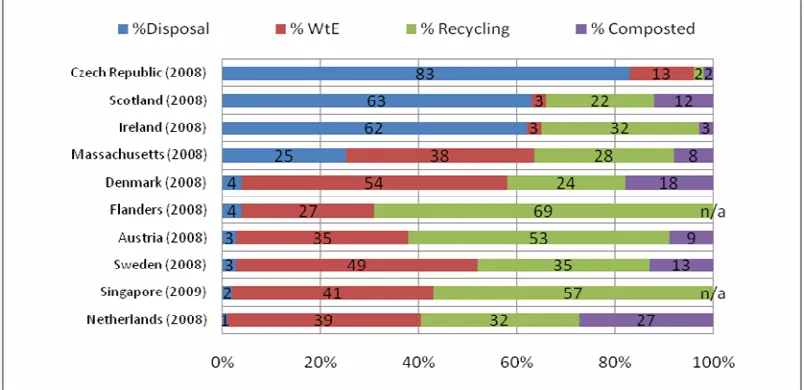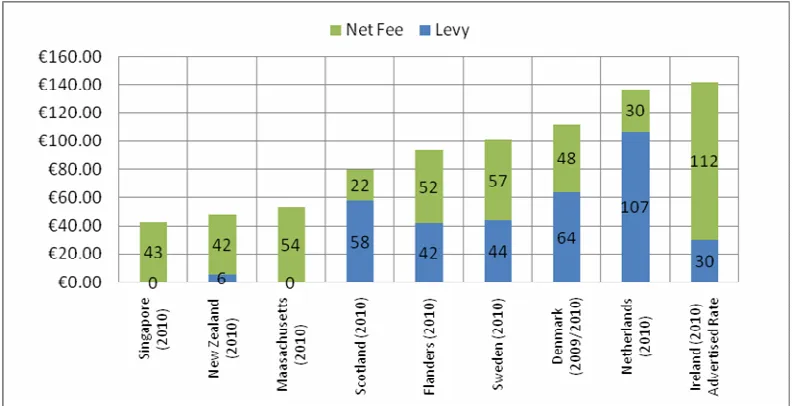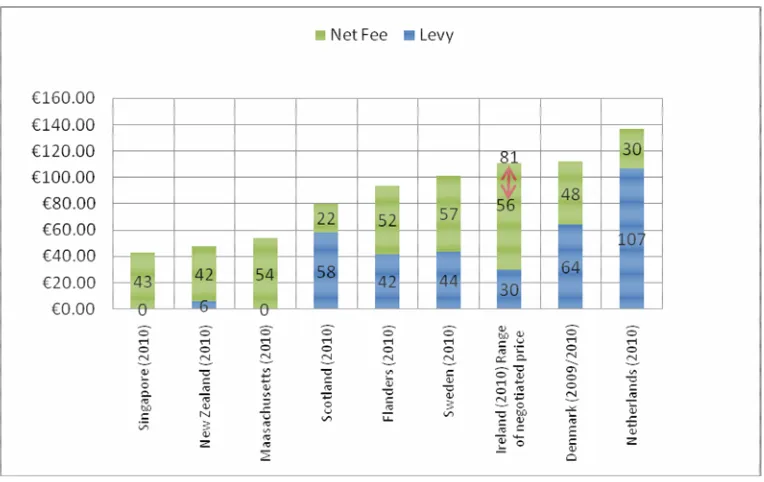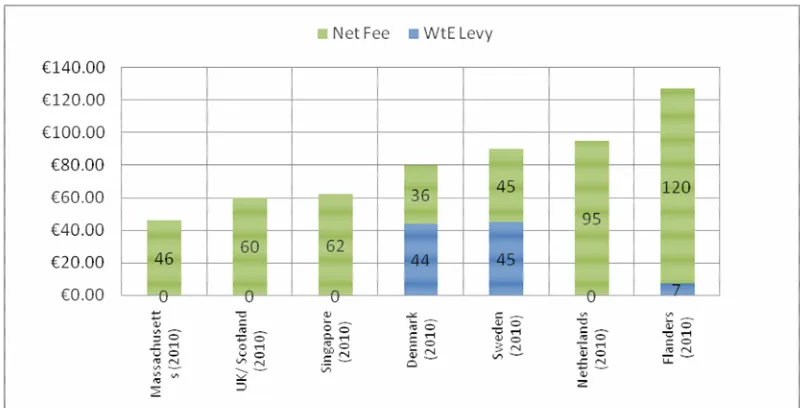Consultation on Draft Statement of Waste
Policy and Section 60
Direction on a
Proposed Cap to Incineration Capacity
Forfás, Enterprise Ireland and IDA Ireland
Submissions to the Department of the
Environment, Heritage & Local
Government
October 2010
Forfás, Enterprise Ireland and IDA Ireland
Submissions to the Department of the Environment, Heritage & Local
Government
The enterprise development agencies - Forfás, Enterprise Ireland and IDA Ireland - recognise that the availability of waste management services and facilities and the associated costs continue to be key competitiveness issues for enterprise in Ireland and welcome the opportunity to comment on the Draft Statement of Waste Policy and the re-consultation on Section 60 Direction on a Proposed Cap to Incineration Capacity being proposed by the Department of Environment, Heritage and Local Government.
Submission 1: The Draft Statement of Waste Policy
1. Executive Summary
The Draft Statement of Waste Policy is a step towards addressing barriers to necessary waste infrastructure development and is welcomed by the enterprise development agencies. At the same time, the resulting policy will need to give due consideration to enterprise development and competitiveness objectives to ensure that businesses operating here are competitive enough to retain jobs and engage in export-led growth.
A number of specific aspects of the Draft Statement of Waste Policy are welcomed by the enterprise development agencies. In particular, the agencies support:
Increased coordination of regional waste plans.
The development of competition for the market rather than competition in the market.
The rationalisation of the waste regulatory functions of local authorities.
The continued resourcing of the National Waste Prevention Programme.
Any revenue recycling measures which would contribute to meeting Ireland’s landfill diversion targets.
Measures to promote the green economy in Ireland, in particular the development of a green public procurement action plan.
At the same time, concerns remain that a number of aspects of the Draft Statement as it stands are sub-optimal in terms of ensuring an “efficient and cost effective waste management sector in Ireland”. In particular, the enterprise development agencies are concerned that:
Measures which would limit local authorities from entering into contracts for treatment or disposal for quantities of waste which would exceed those that they or their agents might reasonably expect to control could hinder the development of a national market for waste.
Increasing costs for business and lower recyclate quality could result from requirements relating to minimum standards of collection services.
Targets and subsequent penalties for local authorities for residual waste could have potential cost implications for businesses.
A cap on incineration will add to the risk and cost of developing necessary waste-to-energy treatment infrastructure.
Current increases in the landfill levy will add to already high business costs here and impact on the ability of businesses to retain jobs.
A waste-to-energy levy before a market is established here or volumetric based levies on waste-to-energy will impact on the development of necessary waste-to-energy treatment infrastructure which Irish businesses currently do not have access to.
That any recycling targets or additional product levies beyond our EU commitments or the abolition of legally-allowable de minimis exemptions would unecessarily disadvantage Irish companies at a time when they are facing unprecedented challenges.
The increasing complexity of waste policy is of concern and certain aspects of the Draft Statement of Waste Policy are unclear and will need further work. The enterprise development agencies would call for the speedy implementation of a final waste policy statement which will provide clear, carefully explained, credible and soundly justified policy recommendations.
[image:3.612.111.513.520.715.2]2. Context
Source: RPS1
Ireland has limited waste management infrastructure options compared with international competitors which is leading to an ongoing heavy reliance on landfill (as shown by Figure 1).
Waste management costs remain an issue for Irish businesses, particularly when increased regulation (such as regulations requiring separation of waste and recycling) are impacting on their bottom line. The recent Forfás Waste Benchmarking Report 2010 shows that although landfill costs in Ireland have moderated, advertised prices and prices negotiable in the market remain comparatively high and that gate fees in Ireland for food waste remain amongst the highest of the benchmark countries/ regions.
Although still remaining high, Irish municipal waste generation per capita decreased in 2008 (most recent data available) in line with the slowdown in economic activity and increased waste prevention measures. Future volumes of municipal waste are expected to increase within the coming decade, necessitating investment in waste management infrastructure2.
There has been limited visible progress in addressing competitiveness concerns and policy priorities for enterprise development which have focused on the need to deliver waste management infrastructure at competitive prices and which have been highlighted in previous Forfás waste benchmarking reports.
3. Content of the Draft Statement of Waste Policy
From a consultation process perspective, there are a number of key areas of the Draft Statement of Waste Policy that lack sufficient detail to allow for in-depth comments.
Policy uncertainty is one of the biggest barriers to addressing the core issues of high costs, reliance on landfill and the development of necessary waste infrastructure. Certain aspects of the Draft Statement of Waste Policy lack detail or are unclear, such as rationalisation of waste regulatory functions of local authorities or national waste planning. The final waste policy statement will require clear, carefully explained, credible and soundly justified policy recommendations which are implemented quickly to address current policy uncertainty.
4. Objectives of the Draft Statement of Waste Policy
The enterprise development agencies believe that alongside environmental sustainability, protecting competitiveness should be a stated priority objective of the final waste policy and measures to achieve this should be clearly set out and explained.
1
Note: Composting figures for Flanders and Singapore were not available and are thus marked as n/a.
2 Assuming an economic recovery, it is anticipated by the EPA’s ISus model that the volume of municipal
Given the unprecedented challenges facing the Irish economy and Irish businesses, it is vital that the final waste policy supports national competitiveness as well as environmental sustainability objectives. The proposed objectives of waste management outlined in the Draft Statement of Waste Policy do not address the need to minimise the cost implications for business nor to improve the competitiveness of business in Ireland by providing access to a range of competitive waste treatment infrastructure options. References to cost
competitiveness in the Draft Statement are vague and it is unclear if the suggested actions will result in improvements.
5. Proposed Policy Measures contained in the Draft Statement of Waste Policy
5.1Waste Management Planning – Section 6.1 in the Draft Statement of Waste Policy
With a view to promoting competition, increasing efficiencies and realising economies of scale, the enterprise development agencies support greater coordination of regional waste plans.
Previous Forfás waste benchmarking reports have highlighted that the lack of coordination of regional waste plans is acting as an impediment to the delivery of cost effective,
commercially viable, sophisticated waste treatment options along the waste hierarchy, as it tends to result in smaller scale facilities than would be the case if infrastructure planning was done at a national level.
As future waste levels are expected to rise as the economy recovers, Ireland will require significant additional waste management treatment capacity across a range of waste treatment solutions. To facilitate competition within and between waste treatment options and to coordinate infrastructure planning at national level, the enterprise development agencies are in favour of greater national coordination of regional waste plans, providing such coordination is done with a focus on increasing efficiencies and addressing national
competitiveness and environmental needs.
5.2 Household Waste Collection Market – Section 6.2 in the Draft Statement of Waste Policy
The enterprise development agencies support the development of competition for the market rather than competition in the market as proposed in the Draft Statement.
The enterprise development agencies agree that the organisation of the market for household waste collection is a key issue requiring urgent action. In addressing the organisation of the market, the enterprise development agencies support the development of competition for the market rather than competition in the market. International experience suggests that
5.3 Waste Management Regulation – Section 6.3 in the Draft Statement of Waste Policy
In principle, the enterprise development agencies support the rationalisation of the waste regulatory functions of local authorities.
Addressing the potentially conflicting role of the local authorities as service or infrastructure providers and as regulators for the sector is of key importance. Although not offering detail, the Draft Statement of Waste Policy is opening the way to consider the rationalisation of waste regulatory functions of local authorities into a single nationally administered
arrangement. The enterprise development agencies in principle support the rationalisation of the waste regulatory functions of local authorities, although clarity is needed on how this is proposed to be done. The final policy statement will need to clarify the relative roles and responsibilities in the regulation and management of the waste sector at national, regional and local levels.
5.4 Direction of Waste – Section 6.4 in the Draft Statement of Waste Policy
The enterprise development agencies support the development of a national market for waste and as such do not support measures which would limit local authorities from entering into any contract for treatment or disposal for quantities of waste which would exceed those that they or their agents might reasonably expect to control.
In developing a national management framework, the enterprise development agencies would recommend that it should allow the development of a national market for waste. The
enterprise development agencies do not support measures which would limit local authorities from entering into any contract for treatment or disposal for quantities of waste which would exceed those that they or their agents might reasonably expect to control. This does not seem coherent if a goal of the national waste management planning is to enhance economies of scale and the scope of treatment options. We do not believe that provisions as to the direction of waste – in particular the capping of quantities of waste for treatment or disposal – will lower the costs of waste services as suggested but will instead stand to inhibit potential economies of scale and scope of activities. In addition, concern is expressed that the term “maximum extraction of materials from the waste concerned” in the final policy should be qualified to ensure that excessive costs - economic and environmental (i.e. where more energy is used than the value of the recyclate material) - are not suffered.
5.5Level of Service – Section 6.5 in the Draft Statement of Waste Policy
The enterprise development agencies are concerned about the potential for increased costs for business and reduced quality of reyclate material which could result from requirements relating to minimum standards of collection services.
same disposal mechanisms and collection systems everywhere could be very inefficient and greatly increase the costs of waste collection in Ireland, which could have knock-on
implications for business costs. In addition, this measure could encourage the co-mingling of different waste streams due to the need for collectors to reduce overall costs which could reduce the overall quality of recyclate material. Such an impact would be contrary to existing policy aiming at improving recyclate quality.
5.6 Targets and Incentives for Residual Waste – Section 6.7 in the Draft Statement of Waste Policy
The enterprise development agencies are concerned about potential cost implications for business of challenging new targets and subsequent penalties for local authorities for residual waste.
The proposed setting of very challenging targets which would require local authorities to secure reductions in the amount of residual waste generated by households in their areas and charges for local authorities with excess tonnage generated will impact on local authority finances and as business rates are a key source of local authority financing, are likely have potential knock-on impacts for business costs. Such a measure is not in line with the polluter pays principle. Little information is provided on what the additional benefit of the targets are, how they will be achieved, how local authorities revenue streams will be impacted (some are likely to be more impacted than others), how they will recoup these funds (i.e. whether there will be potential cost implications for residential or business customers) and what their coherence with proposed increases in landfill levies will be.
The enterprise development agencies do not support a cap on incineration as it will add to the risk and cost of developing necessary waste-to-energy infrastructure.
The proposed cap on incineration levels stands to inhibit economies of scale which are key to bringing Irish waste costs more into line with our competitors. They would also run counter to the internationally accepted waste management hierarchy and would be an Ireland-specific cap without an EU policy context (the only EU caps are on specific materials going to landfill). Such a cap is a command and control measure which is likely to impose needless costs on the economy, particularly where, as in the present case of incineration, there is no underlying rationale presented for the 30 percent target selected. This policy would considerably increase perceived regulatory risk, raise the capital costs of projects, potentially be exposed to competition law challenges, delay the building of essential infrastructure and thus impede the realisation of environmental benefits.
5.7 Waste Facility Levies – Section 6.8 in the Draft Statement of Waste Policy
Waste levies are one key area of cost competitiveness within the Government’s control3. The Draft Statement of Waste Policy commits to significant increases in the landfill levyand the
3 Regaining competitiveness and driving down costs are recognised as key principles to achieve economic
introduction of a levy on waste-to-energy. As shown by the recent Forfás Waste Benchmarking report, Ireland remains among the most expensive of the benchmarked countries/ regions for waste costs (landfill and biological) and Irish enterprises have more limited waste
management infrastructure options than international competitors. The enterprise development agencies are extremely concerned that the proposed measures will further damage Ireland’s cost competitiveness at a time when Irish companies are struggling to maintain market share and employment. Increasing levies on landfill and the introduction of levies on incineration will increase the already very high cost of waste services in Ireland. While the goal of the levies is to increase costs to make landfill less attractive, the challenge instead must be to make composting, anaerobic digestion and recycling genuinely competitive alternatives.
5.7.1 Landfill Levy
Given the current relatively high cost of landfill and the recent policy focus on measures to divert waste from landfill (such as regulations to enforce segregation and separate collection and market initiatives to increase waste prevention and develop the national recyclates industry), the enterprise development agencies contend that the need for significant landfill levy increases has lessened. The agencies do not support any current increases in the landfill levy in the current economic climate and recommend that any future increase in the landfill levy should reflect the pricing of externalities – environmental and other damage – as proposed by the ESRI rather than the pricing of emissions as proposed by the International Review 4.
A number of recent regulatory instruments (such as the Commercial Food Waste Regulation, the revised EPA landfill licence review process and the proposed draft Regulation on Food Waste Collections for Households) as well as market initiatives (such as the Market
Development Programme and the National Waste Prevention Programme) are focusing on the need to divert waste from landfill. The enterprise development agencies contend that these recent measures have lessened the need for significant landfill levy increases, particularly in the current economic climate when landfill costs in Ireland are already relatively high.
As shown in Figure 2 which is taken from the Forfás Waste Benchmarking Report 2010, at an average of €142 per tonne (including the landfill levy) the advertised standard price for landfill in Ireland remains the highest of nine benchmarked countries/ regions5.
4The ESRI recommends a €44.50-55.10 levy for landfills with no flaring or gas capture and reduced rates
for landfills with appropriate methane management.
5
Figure 2: Advertised Landfill Gate Fees (including levy), 2010 (€ per tonne)
Source: RPS6
It is recognised that the landfill gate fee in the market is often lower as the gate charge can be negotiated based on a number of factors such as the volumes of waste offered, the source of the waste, commercial pressures on the landfill owner, credit rating of the supplier offering the waste, etc. Nonetheless, based on the market survey undertaken for the Forfás Waste Benchmarking Report 2010, Irish landfill gate fees in the market were still
comparatively high compared to advertised rates in other countries (Figure 3)7.
6
Notes: The Danish net gate fee refers to that for 2009 (the 2010 net gate fee is currently unavailable). The landfill tax is the tax charged in 2010. The Flemish figure refers to the landfill levy for non- combustible municipal waste.
7 There are currently in the region of 30 landfills open in Ireland. Figures for the negotiable price are
Figure 3: Negotiable Landfill Gate Fees in Ireland versus Advertised Gate Fees in Benchmarked Countries/ Regions (including levy), 2010 (€ per tonne)
Source: RPS
Taking all the ranges of prices quoted, the average price that was possible to negotiate in the Irish market ranged from €56 to €81 per tonne excluding the landfill levy. The average of the minimum negotiated price for 2010 (€56) would place Ireland fifth most expensive of nine benchmark countries/ regions when compared to the advertised fees of these countries/ regions. The average of the maximum negotiated price (€81) would place Ireland at the third most expensive of nine benchmark/ countries regions when compared to their advertised fees of these countries/ regions.
These lower market costs are temporary, dependent on supply and demand as well as the specific economic needs of the private landfill operators and there is no guarantee they will continue. It is also probable that in a time of lower economic activity, market gate fees in other benchmark countries/ regions can also be negotiated downwards. Thus, while the cost environment in Ireland is improving, it is also improving in other countries, limiting the competitiveness gain for Irish businesses.
The proposed significant increases in the landfill levy will further damage our cost
increase in the landfill levy should reflect the pricing of externalities as proposed by the ESRI rather than the pricing of emissions as proposed by the International Review8.
5.7.2 Waste-to-energy levy
[image:11.612.110.512.290.494.2]Due to the need to develop the waste-to-energy market in Ireland as a waste management option for Irish enterprise and to avoid potential damage to Ireland’s reputation as a destination for foreign direct investment, the enterprise development agencies recommend that a waste-to-energy levy should not be considered until a waste-to-energy market is established here9. In addition, proposed volumetric based levies on waste-to-energy should be avoided as they stand to inhibit economies of scale.
Figure 4: Thermal Treatment Gate Fees (including levy) 2010 (€ per tonne)
Source: RPS
Thermal treatment levies do not feature in the cost of thermal treatment in the majority of the benchmarked countries/ regions in the Forfás Waste Benchmarking Report 2010. Sweden is due to abolish its incineration levy in October 2010. Where they do feature, they are lower than landfill levies reflecting the waste management hierarchy or applied in a way that incentivises heat and energy recovery.
8
The ESRI recommends a €44.50-55.10 levy for landfills with no flaring or gas capture and reduced rates for landfills with appropriate methane management.
9 If and when introduced, the enterprise development agencies would be in favour of levies which
Without providing an economic justification, the Draft Statement of Waste Policy contains a number of proposals which aim to discourage the use of incineration and move towards alternative technologies such as MBT. A key instrument proposed to do so (and which was part of a previous consultation process on waste levies) is a proposed waste-to-energy levy but detail remains lacking on the level and timing of such a levy. In terms of meeting the waste management needs of enterprise in a cost effective manner, meeting Ireland’s Landfill Directive targets and promoting energy security of supply and competitive energy prices and renewable energy targets, waste-to-energy can complement alternative technologies such as MBT.
The enterprise development agencies are thus concerned that any waste-to-energy levy before a market is established in Ireland will impact on the development of necessary waste-to-energy treatment infrastructure which Irish businesses currently do not have access to. We thus do not support any introduction of a waste-to-energy levy before the market is
established in Ireland or any volumetric based levies on waste-to-energy.
5.8 Incinerator Bottom Ash – Section 6.9 in the Draft Statement of Waste Policy
The enterprise development agencies are concerned that the classification of incinerator bottom ash as hazardous and that the potential requirement for ecotoxicity will add further cost to the necessary development of waste-to-energy treatment options in Ireland before that market is developed here.
5.9Recycling Targets – Section 6.10 in the Draft Statement of Waste Policy
Due to potential cost implications for business, the enterprise development do not support any recycling targets beyond our current EU commitments.
A number of targets are set out in the Draft Statement of Waste Policy which could impact significantly on business costs. There are currently no specific targets for commercial and industrial wastes in EU legislation but the Draft Statement sets Irish targets for commercial waste and demolition and construction waste. These targets appear challenging when compared with existing levels of recycling and achieving them or penalising their breach could impact on cost competitiveness of Irish businesses10. As well as this, it is not clear if any
10 In 2008, 49 percent of commercial waste was recovered. For construction waste, 79 percent of soil
and stones and 62 percent of other construction and demolition waste was recovered in 2008. The draft Statement of Waste Policy sets the following targets:
Draft Statement of Waste Policy Target 2010 2012 2014 2016
Commercial Waste Recycling Target 55% 60% 65% 70%
2011 2012 2014 2016
additional actions are necessary to achieve these targets and it is unclear of what the implications of failing to meet these targets are.
5.10 Producer Responsibility – Section 6.11 in the Draft Statement of Waste Policy
The enterprise development agencies recognise the importance of producer responsibilities but would be keen for Irish enterprises not be competitively disadvantaged through the abolition of de minimis exemptions or introduction of higher recycling targets or additional product levies beyond those required by EU law.
The enterprise development agencies recognise the importance of the polluter pays principle for waste management policy in Ireland and the enhanced emphasis placed on producer responsibility by the Waste Framework Directive. At the same time, the agencies would advocate the need for the final waste policy to consider business costs in enforcement through avoiding new product levies and recycling targets and for the retention of de minimis exemptions where possible (particularly for small and medium enterprises which already may be under pressure).
5.11 Waste Prevention – Section 6.12 in the Draft Statement of Waste Policy
The enterprise development agencies fully support the continued resourcing of the National Waste Prevention Programme.
Given the projected trends in waste production and the need for businesses to reduce costs, the enterprise development agencies see it as imperative for Ireland’s future competitiveness and environmental sustainability that the necessary resources and commitment continue to be given to the National Waste Prevention Programme.
5.12 The Environment Fund – Section 6.13 in the Draft Statement of Waste Policy
The enterprise development agencies would support any revenue recycling measures which would contribute to meeting Ireland’s landfill diversion targets.
The enterprise development agencies would be fully supportive of any financial support mechanism through the Environment Fund to help private companies contribute to meeting Ireland’s landfill diversion targets and developing necessary waste infrastructures.
5.13 Economic Development – Section 6.14 in the Draft Statement of Waste Policy
The enterprise development agencies are fully supportive of measures to promote



